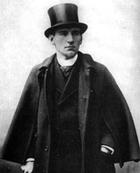
Félix Fénéon was a journalist, art critic and director of several French magazines. With twenty years he went to work in the Ministry of War, where he became famous for the ease with which he lent himself to writing the notes of his colleagues, for whom the mere act of writing involved an insufferable effort. Soon he drew attention to his clear, precise style, with concordance of bizarre rhythms, as well as his ability to write as a code editor. He committed himself to the anarchist movement since 1886, and collaborated with various libertarian newspapers and magazines, becoming temporarily director of one of them. In 1894 he was accused of perpetrating the famous attack against the Foyot restaurant, since, after registering his home and the office he had in the ministry, they found mercury, an element with which he allegedly could have manufactured a bomb. Numerous artists claimed their innocence. He declared that mercury also allowed the manufacture of barometers, and he managed to be acquitted thanks to the persuasiveness of his character. He continued with his journalistic career -he was the editor of the famous Revue Blanche-, he created the publisher Éditions de la Sirène -he was the first to translate Joyce into French- and later became director of the Bernheim-Jeune gallery. After the First World War he would move away from anarchism to approach communism at the hands of his friend the artist and painter Paul Signac. Fénéon was known in life especially as an art critic and discoverer of new talents, such as Seurat or Matisse.




